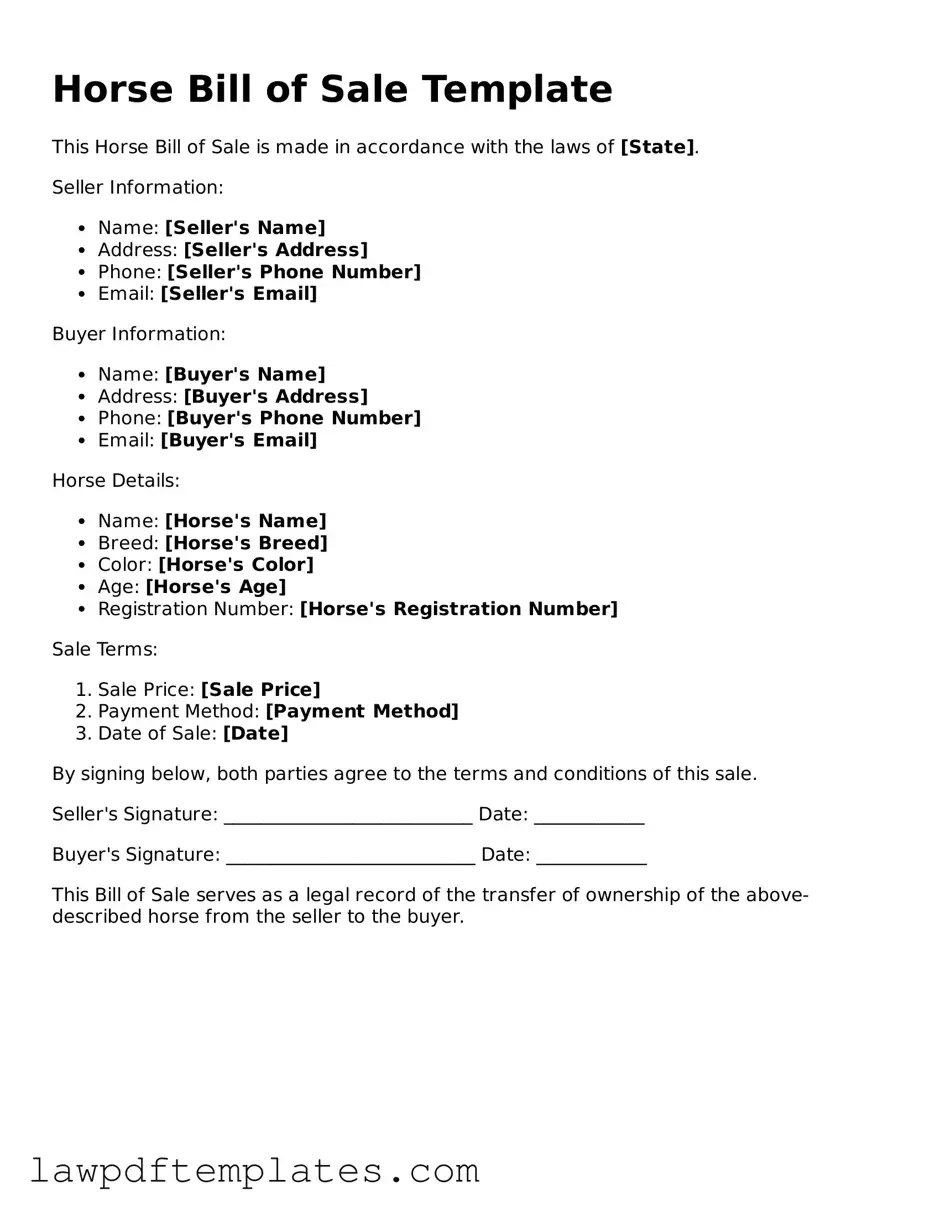Attorney-Approved Horse Bill of Sale Document
State-specific Horse Bill of Sale Forms
Form Breakdown
| Fact Name | Description |
|---|---|
| Purpose | A Horse Bill of Sale form serves as a legal document to transfer ownership of a horse from one party to another. |
| Identification | The form typically includes details such as the horse's name, breed, age, and registration number, if applicable. |
| Seller and Buyer Information | Both the seller and buyer must provide their names, addresses, and contact information to ensure clarity in the transaction. |
| Purchase Price | The agreed-upon purchase price must be clearly stated in the form to avoid disputes later on. |
| As-Is Clause | Many Horse Bill of Sale forms include an "as-is" clause, indicating that the buyer accepts the horse in its current condition without warranties. |
| Governing Law | In the state of California, for example, the transaction is governed by the California Commercial Code. |
| Signatures | Both parties must sign the form to validate the sale. A witness signature may also be required in some states. |
Sample - Horse Bill of Sale Form
Horse Bill of Sale Template
This Horse Bill of Sale is made in accordance with the laws of [State].
Seller Information:
- Name: [Seller's Name]
- Address: [Seller's Address]
- Phone: [Seller's Phone Number]
- Email: [Seller's Email]
Buyer Information:
- Name: [Buyer's Name]
- Address: [Buyer's Address]
- Phone: [Buyer's Phone Number]
- Email: [Buyer's Email]
Horse Details:
- Name: [Horse's Name]
- Breed: [Horse's Breed]
- Color: [Horse's Color]
- Age: [Horse's Age]
- Registration Number: [Horse's Registration Number]
Sale Terms:
- Sale Price: [Sale Price]
- Payment Method: [Payment Method]
- Date of Sale: [Date]
By signing below, both parties agree to the terms and conditions of this sale.
Seller's Signature: ___________________________ Date: ____________
Buyer's Signature: ___________________________ Date: ____________
This Bill of Sale serves as a legal record of the transfer of ownership of the above-described horse from the seller to the buyer.
Common mistakes
When filling out a Horse Bill of Sale form, individuals often overlook critical details that can lead to complications later. One common mistake is failing to include accurate identification of the horse. This includes not only the horse's name but also its breed, age, color, and any identifying markings. Without this information, it can be challenging to establish ownership or resolve disputes.
Another frequent error involves the omission of the seller's and buyer's contact information. Providing complete names, addresses, and phone numbers is essential. This information ensures that both parties can communicate effectively, especially if issues arise after the sale.
Many people also neglect to specify the purchase price clearly. Leaving this section blank or using vague terms can lead to misunderstandings regarding the financial aspect of the transaction. A clear, written amount protects both parties and serves as a reference in case of future disputes.
Additionally, failing to include the date of the sale is a mistake that can have significant implications. The date establishes when the transaction occurred, which is important for record-keeping and potential legal matters. It is crucial to document this information accurately.
Some sellers mistakenly believe that a verbal agreement suffices, leading them to skip the signing of the form altogether. A Horse Bill of Sale should always be signed by both parties to validate the transaction. Without signatures, the agreement may be considered unenforceable.
Another common oversight is not providing a clear description of any included equipment or accessories. If the sale includes items like saddles, bridles, or other gear, these should be itemized on the form. This clarity helps prevent disputes over what was included in the sale.
People often forget to check for any outstanding liens or debts associated with the horse. If a horse has a lien against it, the buyer could face legal issues later. Ensuring that the horse is free of such encumbrances is vital for a smooth transaction.
Lastly, individuals may not keep a copy of the completed Bill of Sale for their records. Retaining a copy is crucial for both the buyer and seller, as it serves as proof of the transaction and can be referenced in the future if needed.
Consider Popular Types of Horse Bill of Sale Documents
Bill of Sale Template for Camper - It can aid in acquiring any aftermarket warranties or maintenance agreements.
Obtaining a Florida Motor Vehicle Bill of Sale is crucial for anyone involved in a vehicle transaction, as it not only helps to clarify the details of the ownership transfer but also serves as an essential legal record. For those seeking a user-friendly option, templates are available that simplify the process; one reliable source is Fast PDF Templates, which provides convenient access to necessary documentation that can facilitate a smoother sale.
